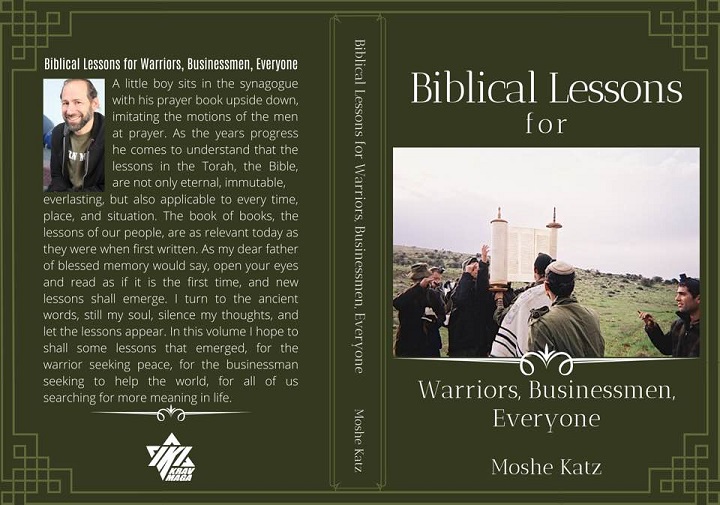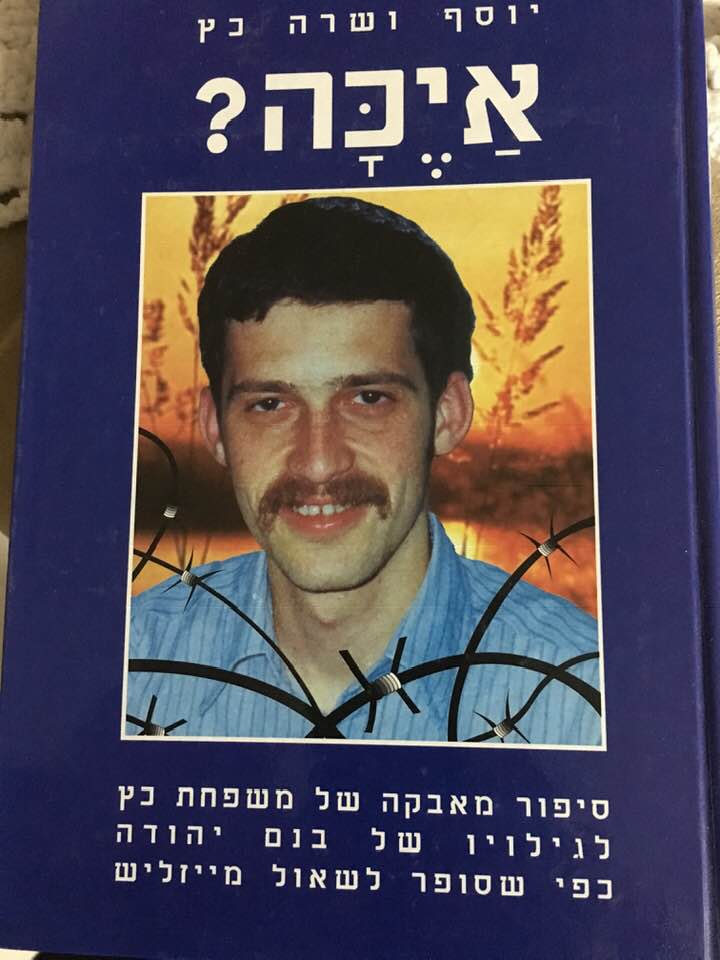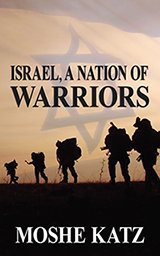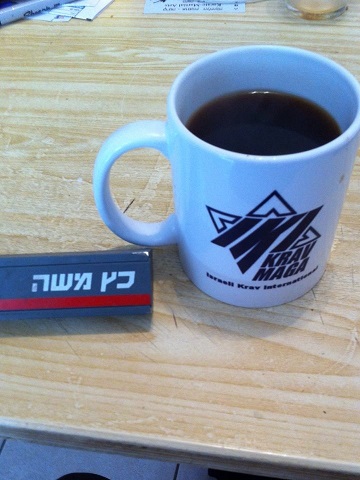- Home
- Krav Maga Blog
- Krav Instructors
- Train in Israel
- Tour Train Israel
- Krav Shop
- DVD
- Kickboxing
- IKI Near Me
- Seminars
- IKI Membership
- On-Line Training
- Krav Maga Training
- Testimonials
- History Krav Maga
- Instructors Page
- Past Blogs
- Spanish
- Italian
- Certification
- Contact
- Holland Seminar
- Vienna Seminar
- Poland Seminar
- Italy Seminar
- Belt Requirements
joseph and his brothers
BY MOSHE KATZ
CEO
ISRAELI KRAV INTERNATIONAL
December 2018, Israel

or on Amazon
Perhaps one of the most emotional and traumatic stories in the Torah is that of Joseph and his brothers; a rivalry that started in their youth, continued into adulthood, began in the land of Canaan, reached its climax in Egypt and finally was resolved with tears, hugs, gifts, and total reconciliation.
Each year as we read this story I feel the emotional tensions, the highs, the lows and the anxiety. When Joseph finally reveals himself I find myself holding back the tears. When father Jacob hears that his son Joseph is alive, the emotions go through the ceiling. Each year I go through this emotional roller coaster and each year I feel something new.
Joseph certainly annoyed and irritated his brothers; all this talk about dreams and greatness, that they would all come to vow low to him, certainly did not endear him to anyone. Their desire to put him in his place is understandable but they went too far. They sold him into slavery, brought their father his coat of many colors drenched in blood and suggested that "a wild beast must have devoured him."
In doing so the real victim here is their father Jacob. And yet, he too was not totally blameless, as King David himself was rebuked for not discipling his son Avshalom, so too Jacob should have tried to handle Joseph a little better. The family clearly had some issues to deal with.
The entire episode raises questions that are debated each year; was it not possible for Joseph to get word to his father that he is still alive? Once he became one of the most powerful men in Egypt surely he could have a messenger to his father?
All these years the brothers saw their father aging, yet never getting over the loss of Joseph, why did no one tell him the truth, that Joseph was not killed but in fact sold? Why was no attempt made to locate Joseph?
Father Jacob, Yaakov, suffered terribly. Such a life is endless pain. I have seen it with families of missing soldiers in Israel, the hope, the doubt, the pain never subsides. Such a person knows no peace on this earth. Poor Jacob had to live this way for many years. When he finally meets his son many years later we see his great relief, this is an indication of all the suffering he had gone through.
Father - Son Reunion
Finally, through a series of Divinely orchestrated events (or sheer coincidence?) Joseph and his brothers meet again. He recognizes them but they have no clue who he is. He plays trick after trick on them until they are in a position that the only way out is to come clean, tell the truth, and suffer the consequences.
Brother Judah/Yehuda, approaches Joseph, and very directly tells him everything. He explains that they must take their youngest brother, Benjamin, back home to their father in Canaan because otherwise it would cause untold emotional harm and suffering to their elderly father. Judah comes forward and makes the ultimate sacrifice; he offers himself as a slave in place of Benjamin.
"So now, please let your servant stay instead of the boy as a slave to my master, and may the boy go up with his brothers." (Genesis, Chapter 44, verses 33)
I was discussing this episode with a dear friend, a rabbi, and the question was, at what point did the brothers repent? and at what point, why and how, did Joseph understand that they were sincere?
It could be argued that the brothers never really repented, but in fact had always acted in their own self interest. When it served their interests they sold their brother into slavery, when it served their interest they told the truth. At this point the only way out was to tell the truth, did that mean that they had actually changed? Was there any remorse?
Was the apology sincere or was it, like many apologies, self serving? I know people who are masters at apologies, it is because they have so much practice and experience. They use apologies to push off their responsibilities, to get the customer to stop nagging them them. How do we know when real change of behavior has taken place, when the apology is sincere?
In this case I have a thought, I "felt" it when reading the passages this year.
Let us look at the buildup in Genesis Chapter 44...
Judah is telling the story of how Benjamin became trapped in Egypt.
"The boy cannot leave his father, for if he leaves his father, he will die." (Verse 22)
Judah continues to argue for Benjamins' release n the grounds that if not, great pain will come to their father.
Regarding his father, he says...Now if you take this one too away from me, and misfortune befalls him, you will bring down my head in misery to the grave. "(Verse 29)
And now, when I come to your servant, my father, and the boy is not with us (since) his soul is attached to his (the boy's) soul. (Verse 30) it will come to pass, when he sees that the boy is done, he will die, and your servants will have brought down the head of your servant, our father, in grief to his grave."(Verse 31)
There is a buildup here, but it is all about...let the boy go for otherwise there will be great pain to our father.
It may be argued, perhaps, this is sincere, or perhaps this is just being opportunistic.
Joseph continues to listen, but as yet there is no reaction. However, when he hears the next verse, there is a reaction.
For how will I go up to my father if the boy is not with me? Let me not see the misery that will befall my father! (Verse 34)
Here Joseph reacts.
וְלֹֽא־יָכֹ֨ל יוֹסֵ֜ף לְהִתְאַפֵּ֗ק
And Joseph could no longer contain himself, He said, Leave me alone! and then he let out his voice in a powerful cry that was heard by all in the palace.
Here our story reaches its emotional climax. Judah was describing the pain that would come to their father if Benjamin was not returned home. However when Judah finally said, "How can I go up to my father and the boy is not with me, how can I bear to see the pain that will happen to my father", that is when Joseph felt the remorse of his brother Judah.
I think of my own father of blessed memory and I can understand the passage, finally, after all these years. I think of my dear father and I know that I would move worlds, speak to Kings and Lords, anything, to prevent any sadness coming to him. How can I bear to see pain coming to my dear father! I cannot. I cannot allow any more pain to come to my father. So Listen ruler of Egypt, I am taking my brother home, you hear me? I am taking him home because my father has suffered enough and I cannot bear to see the pain in my father's eyes.
I understand this.
Finally Joseph understood that his brother had indeed changed. Finally he saw that his brother was sincere. For so many years the brothers allowed their father to suffer. Now Judah stands in front of him, after all the long explanations, and says, I cannot bear the pain of seeing my father suffer. And Joseph can no longer control himself, he can no longer hold back the tears. " And Joseph said to his brothers, 'I am Joseph, does my father yet live?"
The brothers are united in their love and concern for their aged father, Jacob/Yaakov, they put their differences behind them... and he embraced his brother Benjamin and wept,
he kissed his brothers and wept upon them, not a dry eye in the house.
The reconciliation between the brothers, after so many years, took place when it was clear that the words were sincere, not motivated by self-interest, not empty words, but truth.
The reconciliation was only possible when Judah approach his brother Joseph directly, open cards. The Hebrew word Wayeegash, means, and he approached him, no more intermediaries, no more hearsay, no more confusion or ambiguity, direct, open, honest, communication.

"Where Are You?", the story of Yehuda Katz, missing in the battle of Sultan Yaakob, Lebanon War, 1982, by his parents, Yosef and Sarah Katz.
We can appreciate happiness when we know what sadness is. We can appreciate joy when we know what pain is. Jacob lived in pain for many years, the anxiety, the yearning for his lost son, the uncertainty.
I recall meeting the parents of an Israeli soldier missing in action since the famous Sultan Yaakob battle of 1982. The boys' name is Tzivka Feldman. The words spoken by his father will never leave me. "I keep the door to the porch/balcony unlocked at all times, including at night, because I know sometimes he would come home late at night, and in order not to wake us he would come in through the porch."
The father left the door open for his son to come in, although the son has been missing in Lebanon since that terrible battle so long ago. This soldier was named for a grandfather who was killed in the Holocaust. A father leaves the door open for his missing son to come home. It is unending pain, a constant torment of the soul. He is reliving the pain of our father Jacob. The Hebrew Bible is a living lesson, not a history book.
I recall meeting Mr. Yosef Katz and Mrs. Sarah Katz, their son Yehuda Katz went missing in the same terrible battle. (see how the names remain the same; Yosef (Joseph), Yehuda (Judah), we are the same people, living the same story). I listened for a long time to the story. Yosef left his job, traveled the world looking for clues, for someone to help find his son. They wrote a book, "Where are You?" in which they detailed their unending search for their missing son.
I shall never forget the bond that was formed between us; Katz and Katz. Yosef Katz named his son Yehuda after his own father, who was murdered in the Nazi Holocaust, and now he is missing.
Yosef Katz told me the following words which have remained imprinted on my soul ever since. "Why did we write this book about our struggle to find our son? It is because we are old, we shall not live for ever, and someday our son shall come home, I want him to know that mother and father never gave up hope, not for one minute did we rest. I want our son to know how much we tried, we gave up everything to find him. I want him to know this."
And now we return to Father Jacob, and now we understand him a little better, we understand the pain of a father.
The words in Hebrew are so powerful, the dialogue, the back and forth between the brothers, the game, the negotiations, Joseph testing his brothers, and finally the emotional outburst: I am Joseph your brother! Tell me, please, confirm once again that my father yet lives!!!
Joseph instructs his brothers to hurry, give their father the news and bring him to Egypt where finally Joseph can honor his father and give him the best that the country has to offer.
"Hurry up and go to my father and say to him; Thus said your son Joseph, God has made me master over all of Egypt, (and thus I cannot leave at this moment, I unfortunately cannot come to greet you in person), come down to me, do not delay." Chapter 45, Verse 9)
מַֽהֲרוּ֘ וַֽעֲל֣וּ אֶל־אָבִי֒ וַֽאֲמַרְתֶּ֣ם אֵלָ֗יו כֹּ֤ה אָמַר֙ בִּנְךָ֣ יוֹסֵ֔ף שָׂמַ֧נִי אֱלֹהִ֛ים לְאָד֖וֹן לְכָל־מִצְרָ֑יִם רְדָ֥ה אֵלַ֖י אַל־תַּֽעֲמֹֽד
Jacob hears the news but can hardly believe it.
"and they told him (Jacob) 'Joseph is yet alive, and he is governor over the whole land of Egypt, and his (Jacob) heart stood still for he did not believe them." (Verse 26)
וַיַּגִּ֨דוּ ל֜וֹ לֵאמֹ֗ר ע֚וֹד יוֹסֵ֣ף חַ֔י וְכִי־ה֥וּא משֵׁ֖ל בְּכָל־אֶ֣רֶץ מִצְרָ֑יִם וַיָּ֣פָג לִבּ֔וֹ כִּ֥י לֹא־הֶֽאֱמִ֖ין לָהֶֽם
Finally when Jacob was convened that this is the truth, he said, "It is enough (it is enough for me that he is alive, I don't care if he is ruler or not, wealthy or nor, famous or not) I will go and see him before I die." (Genesis, Chapter 45, Verse 28)
וַיֹּ֨אמֶר֙ יִשְׂרָאֵ֔ל רַ֛ב עֽוֹד־יוֹסֵ֥ף בְּנִ֖י חָ֑י אֵֽלְכָ֥ה וְאֶרְאֶ֖נּוּ בְּטֶ֥רֶם אָמֽוּת
When Jacob hears this he knows that now his life has reached its completion, now he can finally die in peace, he can rest in peace knowing that his son is well. Such is the love of a father for a son, he lives for his son and he can only die when he knows that his life mission is completed. Now he can go and his son will follow in his footsteps.
It is only with this news that Jacob can finally depart in peace from this world, only now his soul is at peace, finally.
My friend had asked, How do we know that the brothers truly repented and regretted their previous behavior? Joseph too wanted to know this, and he put them through a thorough investigation, playing tricks on them until the answer became clear. When he saw the true love they felt for their dear father, when their concern over their father overrode their own personal welfare, when Judah was willing to give up his own freedom and become a slave rather than allow his father to suffer any more pain, Joseph knew that a change had taken place.
The very last prophet, Malachi, in his last prophecy, said the following;
"that he may turn the hearts of the fathers back through the sons, and the hearts of sons back through their fathers" (Malachi, Chapter 3, Verse 24)
The last prophecy of the last prophet is a wish for fathers and sons to be reunited. The heart of the father shall be on the sons, and the hearts of the sons shall be on the fathers. Jacob and Joseph are united. Father and son reunion. Even death cannot separate father and son, the conversation never ends...
וְהֵשִׁ֤יב לֵב־אָבוֹת֙ עַל־בָּנִ֔ים וְלֵ֥ב בָּנִ֖ים עַל־אֲבוֹתָ֑ם
(מלאכי ג כד)
Visit our other site
Israeli Krav International.com
Israel: A Nation of Warriors
by Moshe Katz

Biblical fighting methods and strategies.
The history of Biblical fighting.
Over 300 pages, the history of Israel and the Jewish people as a fighting nation from the days of Abraham to our own times. The book covers the history and roots of Krav Maga and the modern Israeli Defense Forces. The book analyzes what makes Israeli security the best in the world.
Why makes Israeli airline security the best in the world?
What is the Israeli approach and mentality that make us the leaders in the security industry and personal safety field, and being sought after all over the world?
What weapons and strategies did our Biblical ancestors use?
The answers are in this book.
(cover by Arie Katz)
Israel, A Nation of Warriors, Amazon
